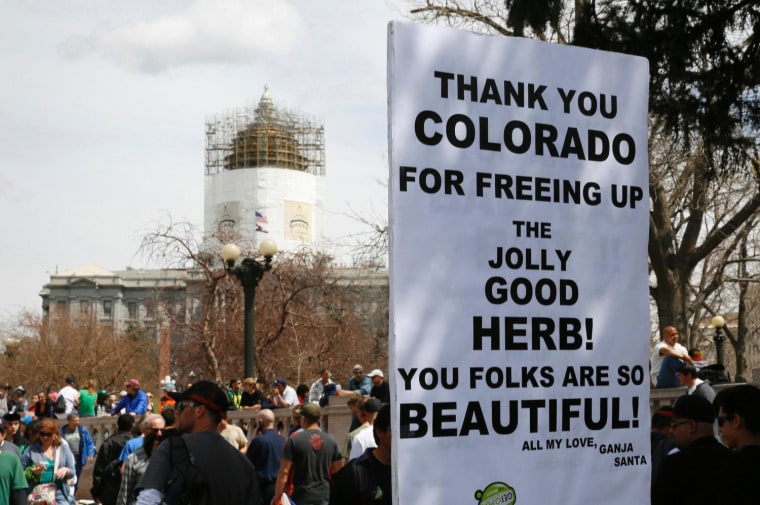The Department of Justice's decision on Thursday not to sue Washington and Colorado for permitting recreational marijuana use is being celebrated by advocates as such a huge national step for pot legalization, it's comparable to the end of Prohibition.
"In my lifetime, it was by far the most important change in marijuana federal policy on the federal level," said Keith Stroup, founder and legal counsel at the non-profit National Organization for the Reform of Marijuana Laws (NORML).
"All of sudden, they have decided to let the states experiment with different levels of legalization. That's precisely what happened at the end of alcohol prohibition."
Dan Riffle, director of federal policies at the Marijuana Policy Project called the DOJ's move — which also gives immunity to 18 states and the District of Columbia, where medical marijuana is permitted — unprecedented.
"The biggest issue facing Colorado and Washington for the last nine months has been what the federal government will do about the initiatives that were passed out there, and the answer that we got yesterday is 'Nothing,'" he said.
Next year, Oregon and Alaska are likely to see ballot-initiated marijuana votes. And in 2016, the Marijuana Policy Project is aiming to get similar measures on the ballot in five more states: California, Oregon, Arizona, Nevada, and Maine. Massachusetts may also see a marijuana measure in 2016, according to NORML's Stroup.
"The message to not only Washington and Colorado but to states around the country is that the federal government is no longer going to dictate marijuana policy to the states. They're free to chart their own course on marijuana. It's really, in a lot of ways, the beginning of the end marijuana prohibition," Riffle said.
It also could be the beginning of a booming industry, one that's piqued not just the interest of advocates, but investors, too.
Officials said on Thursday that Attorney General Eric Holder called the governors of both Washington and Colorado to tell them that federal authorities won't preempt their state laws permitting recreational use of marijuana for adults, which voters approved last November via ballot initiatives.
Holder told the governors the Justice Department will use a "trust but verify" policy: If the states can develop a workable approach to the marijuana laws, the federal government won't step in to prevent their implementation.
It was a historic reversal in the U.S. government's war on drugs, and gives voters in other states ample opportunity to allow similar marijuana measures to be approved without fear of their state laws being challenged in a nation where marijuana is still illegal under federal law.
This year, about 10 states introduced pot-related bills, Stroup said. But most didn't get serious consideration in their legislatures.
"A lot of people simply felt there was no need to take the political risk of supporting legalization at the state level if the feds were simply going to challenge it in court," he said.
Investors taking notice
The announcement also has big implications for marijuana's potential industrialization.
“You can bet a lot of investors woke up today and are doing a lot more due diligence on this industry,” said Chris Walsh, editor at Medical Marijuana Business Daily.
“It’s going to increase the amount of money that’s being invested in the emerging industry, and it’s going to increase the number of players,” said Ethan Nadelmann, executive director of the pro-marijuana Drug Policy Alliance. “They’re going to have an easier time raising money and you’ll see newer players and more competition."
He said the DOJ's announcement would embolden other states to move forward with their legalization efforts.
The risks of a federally illegal business has kept a lot of money on the sidelines, said Justin Hartfield, partner in the Emerald Ocean Group, a marijuana-based venture capital firm that launched in March.
“Up-front investment is very little relative to other industries, but I think the fed’s statements might encourage more,” he said.
Advocates say this patchwork of sometimes-conflicting legislation presents an ongoing challenge for marijuana to grow as a business. Federal banking and tax regulations still make it difficult or impossible for pot-related businesses to accept credit cards, deduct business expenses and other operational details other industries take for granted.
"Will the feds now change their approach on the nitty gritty?" Nadelmann said. "Hopefully now the White House or DOJ will resolve the issues."
Hurdles on the local level
While the DOJ's decision may have signaled a shift in the administration, elected officials on the state and local level may not be as keen on legalizing marijuana, which is why most of the measures need to come from voters, said Stroup.
"All of the polls show we now enjoy a majority of support for the full legalization of marijuana among the American public, but that doesn't mean we have the support among elected officials," he said. "They're concerned about their next election and they're worried some of their constituents are going to take a position against them if they vote for marijuana legalization."
In a memo to the governors of Washington and Colorado on Thursday, the DOJ outlined eight priorities for federal prosecutors who enforce laws dealing with marijuana, including offenses such as the distribution of marijuana to minors, violence or firearms in the distribution of the drug, or the sale of marijuana to fund gangs or cartels.
The DOJ also said it's reserving its right to file a a preemption lawsuit at a later date — since the states' regulation of pot is illegal under the Controlled Substances Act — but advocates aren't worried.
"At this point it's clear to everyone in Washington that legalizing, taxing and regulating marijuana is a matter of when, not if," Riffle said.
Related content:
